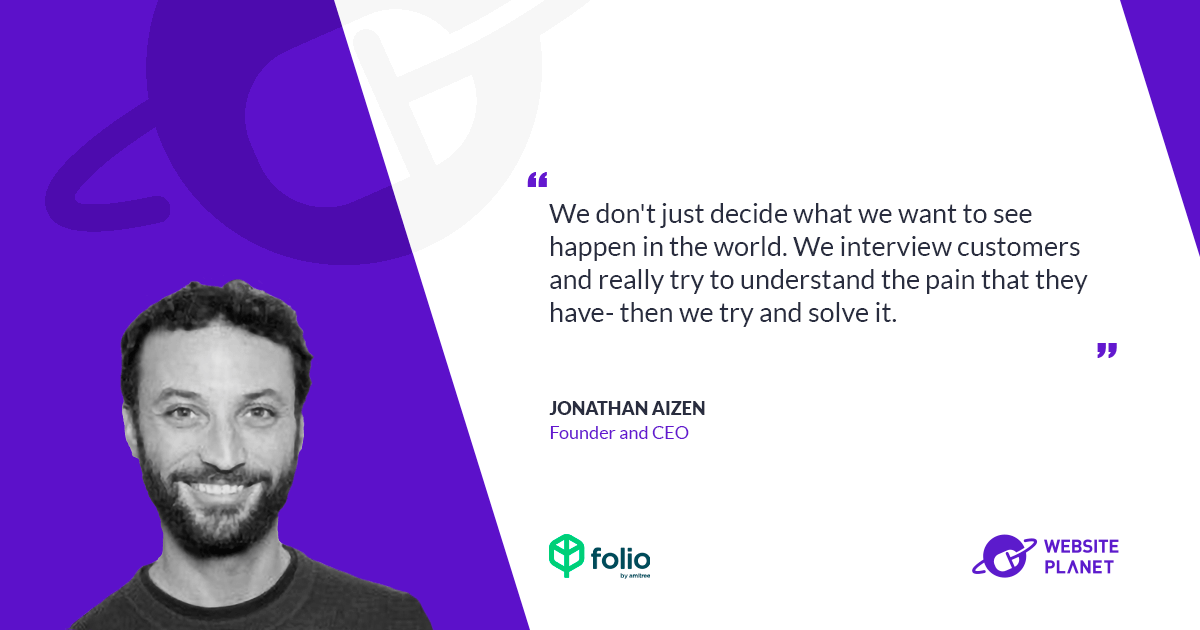
This article originally appeared on Websiteplanet.com
It represents an interview that our Founder and CEO, Jonathan Aizen gave for Website Planet.
What does Amitree do?
Our objective is to enable people to do what they do best, better. The reality is that a lot of people waste a lot of time in their email rather than doing their actual work.
We try to free them up from that by automating a lot of the repetitive processes and workflows that they conduct in their email so that they can focus on the parts of their job that they love, that are strategic and that require their unique skills.
How did the company start?
When my wife and I bought our first home we had a positive experience overall, but you know, being an entrepreneur and a software engineer- I saw a lot of problems throughout that process.
What I observed as we went through the process was that our agent spent a significant portion of his time, maybe even most of his time, doing work that isn’t the work that made him valuable. He was spending his time on tedious administrative work that wasn’t really great use of his time and obviously not the reason he gets up in the morning.
I understood right away that this was not a real estate-specific problem – it’s a modern work problem. We have inefficiencies in how we go about our work, those inefficiencies end up taking a disproportionate amount of time. They hold us back from having the most fulfilling professional experience and being as valuable as we can be. Not to be too weird and dystopian, but if the robots are coming for our jobs- we kind of must contend with that. That means, we need to spend our time doing work that is uniquely human.
So, I looked at this and was a little distraught because I thought my real estate agent was a valuable and important person. It was unfortunate in my mind that he was spending so much time doing work that wasn’t the sort of work that made him most valuable – and I saw a lot of parallels for many other professionals.
To solve this issue, we decided to start in the real estate space and have been fortunate to have had a lot of success. Our product, Folio is currently used to manage about 40% of all the real estate transactions in the United States. But, more importantly to us, it’s loved and highly rated by our users.
We have been executing from there in terms of expansion. We started there, but we’re not limited to real estate, and it’s a very natural evolution to take the same great features that save real estate agents time and make them available to all professionals.
Our product now benefits anybody who is managing their work by email – folks who are effectively forced to use email as the solution to manage complex projects, processes, or clients – as email still dominates the business communication world.

Please let us know why your company values are important and how they play out practically for your customers?
The values are, like with many companies, our guiding principles for how we want to conduct ourselves and the way that we think about what we value. The values come into practice in how we work together as a team, but also in how we work with and think about our interactions with our vendors, partners, and customers.
Say and do the hard things: The notion here is that it’s sometimes much easier to just avoid saying something if you’re concerned the other person is going to be defensive or take issue with it. The way we think about this value is that it’s important to be explicit and to be willing to say things- even if we’re wrong, or even if the other person might not like it. It is important for us to do it in the context of caring personally about the other party.
How this comes across in the day-to-day is that sometimes customers might have an issue or a problem or be upset about something. The way that we obviously try to interact with them is to be supportive, kind, and empathic- but, we also are honest and upfront.

Invest in others: This is about imagining what other people need and being proactive in our willingness to serve them. For example, when we develop the product for customers, we do it with them. We don’t just decide what we want to see happen in the world. We interview customers and really try to understand the pain that they have- then we try and solve it. This is a form of investing in them. We believe that all these values not only lead to more productive conversations and work but also, they help drive a successful business.
Can you provide an example of when a customer wanted to use the product for something that it was not intended for? How did you respond?
Absolutely, we are always learning from our customers, and we try to be open-minded about where the product can and should go. We also have a certain vision, but at the end of the day, our vision is to help people do what they do best better. So, who are we to tell them that they shouldn’t use the product in a certain way? An example of this is:
In the early days, you couldn’t really sign up with us unless you were a real estate agent. However, we found that people who were not real estate agents (mortgage brokers and title officers in the real estate space, etc), were signing up. We were really confused by this because clearly, they could tell that the product was designed to use by a real estate agent. This was one of the things that told us that we should open the product up to others faster than we might have otherwise intended.
The world has been affected by the Covid-19 pandemic. How has that affected Amitee for both your employees and customers?
I think everybody saw a tremendous amount of chaos and fear at the onset of the pandemic. The first thing we did was to tell all users of Folio that they would be able to use the paid version of the product for free – we did that throughout the early part of the pandemic to support them. Clearly, we had to take the hit for this financially, but it was the right thing for us to do on a human level.
Much like other SaaS companies, we saw a lot of uncertainty at the beginning of the pandemic and sharp drop-offs in new user acquisition and activity in the product. However, those trends reversed themselves fairly quickly as people got back to work. But, it was a different type of work – a new type of work that was essentially 100% remote for most people. This led to professionals needing to adapt and adopt new solutions and tools to be able to maintain efficiency (and sanity). Folio is well positioned to the new normal of work as it is built to keep you (and your colleagues) organized while working together through multi-step projects.
Finally…
We relentlessly focused on improving the workflow of busy professionals, and there is always room to continue improving that process. However, there are a lot of additional things that we can help with. I’ll give you some examples of our taking the product deeper into the workflow. We really help people with two key things.
One is information retrieval. So, for example, let’s say you’re an architect and somebody sends you an email asking for the floor plan. You don’t know who the person is or what floor plan they are referring to, therefore you need to spend time digging through your email to find what they have asked for. Folio can just surface that file for you because it knows who this person is, and it knows what project you worked on with them, and knows all the attachments related to that project. So that’s an example of information retrieval.
The other thing that our users find very valuable is around workflow automation. So, reminding people when important dates are coming up, letting people know if a date is changing, or if the status of something has changed. We do that automatically on the user’s behalf.
There are a lot more aspects of the workflow such as reducing steps when a user needs to compose an email that follows a similar formula to emails they’ve sent before or making it easier to integrate their email with some of the systems that they use. For example, we have been working with event planners recently and many of them use various systems to manage their events. Most of the communication and the files get exchanged by email, and so they find themselves downloading files from their email to upload them to the system. So, we offer more integrations.
We already have great integrations with DocuSign and Salesforce, and we are very deeply integrated with the entire Google product suite. But there are a lot more systems that these busy professionals use. So, you can expect to see more in the way of integrations.
The goal over the next few years is really to continue innovating, investing in our core technology, which is using a bunch of interesting machine learning techniques to reduce the amount of time that people are spending on email organization, and all this sort of management and workflow, to let them focus on the part of their job that they, they love the most.
Who we are
We've built Folio: the first AI email assistant for professionals.
Folio plugs directly into your work email inbox and automatically organizes your email, giving you contextual access to all the information you need to increase your productivity in minutes.
We are a team of passionate product people and engineers that gets excited about solving complex processes and creating value for people.
We're a venture funded company backed by Accel Partners, Vertical Venture Partners, and other leading venture capital firms and angel investors such as Ash Patel and Jerry Yang.



